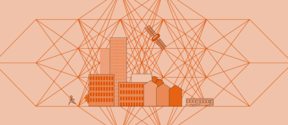New Assistant Professor Oscar Kivinen wants to expand Finnish mathematics research

What are you researching and why?
I study a wide range of topics, from algebraic geometry to mathematical physics. My main research interests include knot theory and representation theory.
I was introduced to knot theory during my doctoral studies. Knots are amusingly intuitive objects because you can actually mentally visualize them and also produce nice pictures of them. The basic problem of knot theory is how to decide whether two knots are different – to find out, you can twist and turn them around, but usually the mathematical approach is to attach for instance polynomials to them according to particular rules. The mathematics of knots relates in surprisingly profound ways to other areas of mathematics, including, in my own research, the so-called Langlands program. Ultimately, knots can make it easier to calculate really complex things.
Representation theory, on the other hand, is essentially about symmetry. For example, fundamental theoretical physics, including the mathematical formalisation of elementary particles, is heavily built on it. My own work is more concentrated on basic research though.
How and why did you become a professor or researcher?
That's a good question. I suppose I had this childhood fantasy, based on Hollywood movies such as A Beautiful Mind and Good Will Hunting, that in academia one walks around campus in a tweed jacket and thinks about very difficult things. I then tried to go to the deeper end.
After high school, I was admitted to both medical school and to Aalto University, and soon found myself wanting to go into a more mathematical direction than what medicine had to offer. At Aalto, I completed a degree in engineering physics with a major in mathematics, but with a more applied orientation than what I have today. I did my PhD at the University of California, a postdoctoral phase at Caltech (California Institute of Technology), as well as at the University of Toronto and EPFL in Switzerland. Yet for a long time I didn't know if a career in mathematics was going to work out, and I kept my right to study medicine up until 2020.
What made you come back to Aalto?
I've had the dream of returning to Finland for a long time. I originally come from the Helsinki region and here there are practically two options, Aalto and the University of Helsinki. Now it just so happened that Aalto had two positions open last fall.
Of course, it was nice to come to a place where I’ve been before, where I know how everything works, and what could be done here. It was an eye-opening experience for me to be abroad and see how broad the field of mathematics really is. In Finland you see but a small corner of it. Historically, we have had a very strong school in analysis, and although I am not the only algebraist in the department, I think that it feels timely to expand the variety of research areas studied here. I feel that already from the high school level upwards, there is a lot of room for diversification in what is taught in Finland.
What do you consider the highlight of your career so far?
I would say the Caltech postdoc position. It's a highly regarded institution and a nice place to be, the weather in Southern California is great, and the university has great professors and students. I also had a good mentor whose work had a somewhat different emphasis than mine and who further expanded my own mathematical worldview.
What are your expectations for the future?
I'm looking forward to catching up with everyday life here and building my own research group. I also hope to bring in funding and to work on my various lobbying goals. One of the things I would like to concentrate on is broadening the scope of funding available for mathematics research; from Finnish foundations to the business world, in addition to traditional sources such as the European Research Council and the Research Council of Finland.
Read more news

DeployAI Partners Gather for Heart Beat Meeting in Helsinki
The European DeployAI project's partners gathered for the Heart Beat meeting hosted by Aalto University Executive Education in Helsinki.
Get to know us: Associate Professor Maria Sammalkorpi
Sammalkorpi received her doctorate from Helsinki University of Technology 2004. After her defence, she has worked as a researcher at the Universities of Princeton, Yale and Aalto.
Aalto computer scientists in ICML 2024
Computer scientists in ICML 2024